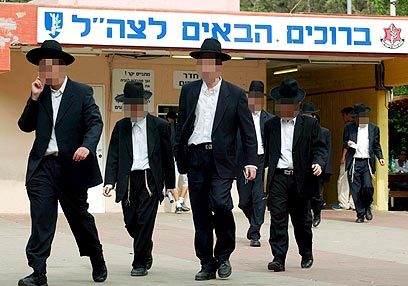
Kadima MK Yohanan Plesner, who headed the Plesner Committee to devise an alternative to Tal Law, presented the panel's findings Wednesday, despite them being rendered toothless.
The committee, tasked with forming provisions for a universal draft that would include the haredi and Arab sectors, was dissolved by Prime Minister Benjamin Netanyahu on Monday.
Related stories:
- Netanyahu dissolves Plesner Committee
Plesner Cmte member: Historic opportunity missed
Op-ed: From now on we're just suckers
The move was harshly criticized as one meant to placate the religious parties and avert a crisis that might topple the Coalition; as well as cowering before the Arab public's wrath.
"The committee met for hundreds of hours, held dozens of meetings, heard dozens of experts, performed exhaustive staff work… in an effort to produce the most comprehensive work on this subject in Israel's history," Plesner stated on Tuesday. "We have every intention of releasing our findings."

Equal is as equal does? (Illustration: Zvika Tishler)
The 90-page interim report "can lead to a fundamental change in Israeli society by creating a new social treaty that will see more sectors on Israeli society shoulder the burden of service," its executive summery said.
"We do not wish to trample on any sector's rights. We aim to foster a historic change and create a more cohesive, united society."
The committee found that the State should follow a strict set of supra-principles regarding universal draft, including:
- Imposing the principle of universal service on all Israeli citizens.
- Imposing individual liability on anyone trying to evade the service.
- Offering those serving in the IDF incentives and increased compensation.
- Formulating an effective enforcement system against those violating draft directives.
- Mandating the draft of ultra-Orthodox men.
- Applying the principle of universal service to the Arab sector via National Service opportunities.
'Yeshiva students service mandatory'
The committee determined that by 2016, 80% of yeshiva students who are of draft age every year would perform either IDF or National Service.
Furthermore, the panel recommended that anyone dodging the draft would be subject to individual financial sanctions, including an NIS 7,500 fine (roughly $1,920); an additional NIS 75 ($20) fine for every day of draft dodging; revocation of housing and city tax benefits currently available to the haredi sector; and the revocation of their monthly student stipend, which currently stands at NIS 850 (roughly $280).
Additionally, individual criminal action and financial sanctions against yeshiva seminaries might also be applied. Yeshivas found to be impeding their students' draft would face immediate sanctions, including suspension of all State funds and closure.
The committee determined that all haredi youths must perform service by age of 22, excluding those defined as "prodigy students," stating that the latter group will not exceed 1,500 students a year.
Paving the way for Arab integration?
The committee recommended implementing the principles of universal service on minorities, within special avenues in the framework of the National Service.
The report said that Israel "Must devise an alternative to (Arabs') service in the IDF and create a framework that would enable Arab youths to contribute to their community and country.
"The committee believes that such moves would create a compromise between the principles of mandatory obligations and rights and the objection national issues that impede the sector's youths' service in the military."
Devising such a compromise, the report added, "Will have positive, far-reaching social implications for the standing of Israeli Arabs in society; and the relationship between Jews and Arabs in Israel in general."
The committee stressed that the following steps must we implemented in order to promote the issue, including:
- Anchoring mandatory universal service for the Arab sector via legislation.
- Implementing the service gradually; with the first objective being increasing the number of Arab youths performing National Service to 6,000 within five years.
- Offering various incentives to those complying with the universal service directives
- Forming a professional team, which will include prominent Arab experts, to review the recommendation and file reservations – if there are any – within six months' time.
- Imposing sanctions on Arab community heads who actively impede members of their communities from performing National Service.
The committee noted that "This will pave the way for the sector's better integration in Israel's social and political fabric."
The report met fierce criticism from Knesset members from across the political spectrum.
MKs from the religious parties said the recommendations were predetermined; Opposition Chairwoman Shelly Yachimovich called it "a hoax," while Meretz Chairwoman Zehava Gal-On said it was is "Kadima's swan song."
- Receive Ynetnews updates
directly to your desktop















